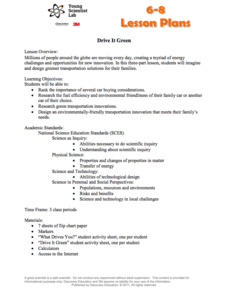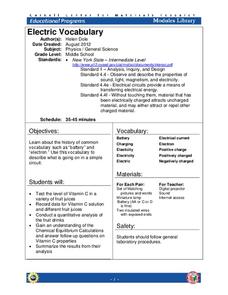PHET
Features of the Sun
There are so many things to discover about the sun! Pupils discuss their knowledge of the sun, explore its features, apply their knowledge by labeling photographs, and then reflect on their learning by working in groups to draw and label...
American Chemical Society
What is a Chemical Reaction?
When a candle burns down, what happens to the mass that appears to be shrinking? Lesson begins with a demonstration of the chemical reaction of a candle burning. Then scholars use atom models to observe conservation of mass concretely.
Discovery Education
Drive it Green
Explore and brainstorm innovations for cars with a STEM lesson that asks scholars to weigh different options when considering when buying a car. They research the fuel efficiency and carbon emissions for various options, and then design...
Lawrence Hall of Science
Photolithography
Examine the use of photolithography in the fabrication of circuit boards and other components. An advanced activity teaches pupils a process for transferring a pattern onto a surface. Using UV light and a light reactive substance,...
Chymist
Earth Science
Explore the consistency of the earth's layers and soil through modeling. By conducting an engaging experiment, learners develop a model for the earth's layers and a soil profile using edible materials. Each material is chosen based on...
NOAA
Microfriends
Is there medicine found in the organisms that live deep below the surface of the ocean? The fifth lesson in a six-part series has learners team up to research bacteria and the relationship it has with nearly every living thing on Earth....
American Chemical Society
The Energy of Evaporation
Do all liquids evaporate at the same rate? Young scientists observe the evaporation rate of three different liquids. They measure the time, the temperature, and the change in energy. After comparing the chemical formulas, scholars...
American Chemical Society
The Energy Efficiency of Heating Water
Can a small change in laboratory procedures save energy? Scholars test three different methods for heating water in a science lab. Then, they calculate the energy efficiency for each and compare them to determine which uses the least...
American Chemical Society
Energy and Entropy of a Stretched Rubber Band
Stephen Perry invented and patented the modern rubber band in 1845. Young scientists put his discovery to work as they use rubber bands to observe entropy and enthalpy. They determine the change in free energy to figure out if it...
Cornell University
Electric Vocabulary
Practice electric vocabulary using multiple methods. Learners begin by watching a video that explains vocabulary related to electric currents. They match vocabulary cards to practice and then create an electric circuit. Using the...
DiscoverE
Rocket Challenge
You might just be responsible for launching a future career in rocket science. Pupils use Alka-Seltzer® tablets as the power source for a film-canister rocket. These rockets must able to carry a clay payload and hit a target on a wall.
DiscoverE
Build a Big Wheel
Pasta is great for cooking—and for making Ferris wheels. Aspiring engineers use an assortment of pasta types to create a functioning Ferris wheel. They keep track of the design process to refine their designs, if necessary. Let's hope no...
DiscoverE
Build a Better Candy Bag
Every child's dream: stuffing as much candy into a bag as possible. Doing this, though, requires a nice sturdy bag. Scholars design the sturdiest bag they can and test the limits of those bag using a sweet treat!
Royal Society of Chemistry
Electrochromic Polymer—Chemistry Outreach
From windows that tint themselves to OLED technology, electrochromic polymers are redefining our ideas about conducting materials! Introduce your chemistry class to the emerging trend with an exciting lab activity. Budding materials...
DiscoverE
Clean It Up
Water, water, everywhere, but not a drop to drink—until we clean it, of course! Scholars design a filtration device that removes pollutants from water. The goal is to have the water come out as clean as possible from the device. How...
DiscoverE
Spaceship to Mars
Feel like a rocket scientist for the day. Using only paper and tape, scholars create a framework for a spaceship to Mars. Each sheet of paper costs $10 million and each piece of tape costs $100,000. Make sure you stay within budget!
Teach Engineering
Glowing Flowers
What a bright idea! Young scientists conduct an experiment on flowers to finish the last of a six-lesson unit on Cells. Putting the stems into dye-injected water and leaving it overnight results in flowers that glow. This is to simulate...
Nuffield Foundation
How Much Energy Is There in Food?
People associate calories with food, but what is a calorie? Young scientists measure the number of calories in samples of food to better understand the concept. They test a variety of samples, take measurements, and compare their results...
Nuffield Foundation
Assessing Human Hearing
Young scientists explore hearing through multiple experiments, demonstrations, and activities. They focus on the changes in hearing over a lifetime, how we can determine where a sound is coming from, and the ability to filter noises.
Nuffield Foundation
Investigating Osmosis in Chickens' Eggs
You might not be able to learn through osmosis, but you sure can observe it! Scholars observe and measure osmosis using chicken eggs. They control for multiple variables to determine which variables have an impact and how the impact...
Nuffield Foundation
Observing Water Moving Through Plants
We know plants assist in the water cycle, but how do plants get water from the ground into the air? Through a series of demonstrations or labs, scholars observe the movement of water through plants. They microscopically view the cells...
US Surgeon General
Get the Facts on E-Cigarettes
Imagine these flavors: chocolate, candy, menthol. What age group do you imagine is the target audience of an advertising campaign that features a product with these flavors? Find out the facts about vaping with a resource that provides...
Nuffield Foundation
Following Gene Transfer by Conjugation in Bacteria
After the lab, you'll be able to solve this analogy: Natural selection is to vertical transfer of genes as ___ is to the horizontal transfer of genes. Young biologists conduct an experiment on E. coli bacteria to explore the process of...
Kenan Fellows
Applying Linear Regression to Marathon Data
It's not a sprint, it's a marathon! Statistic concepts take time to develop and understand. A guided activity provides an opportunity for individuals to practice their linear regression techniques in spreadsheet software. The activity...

























